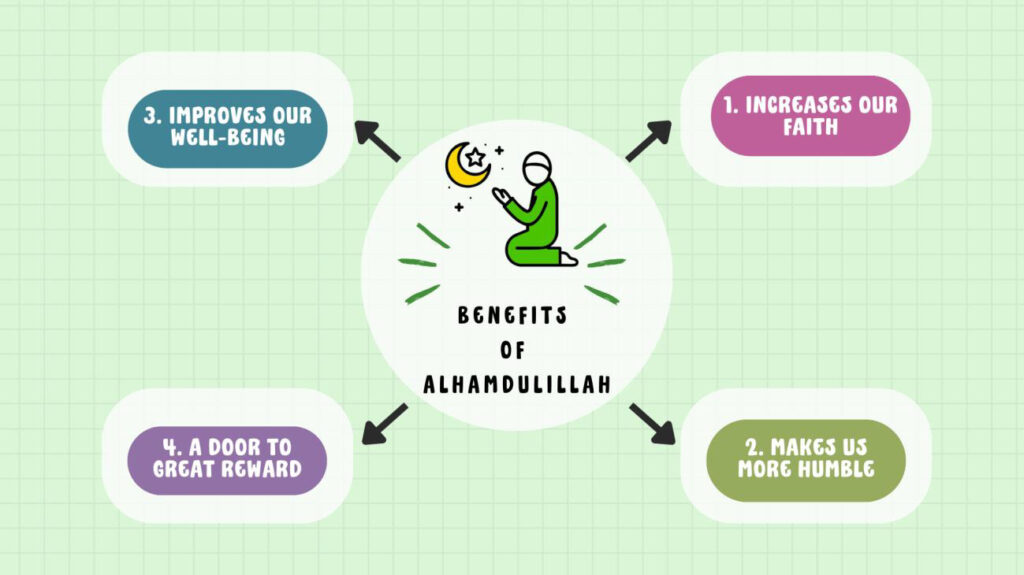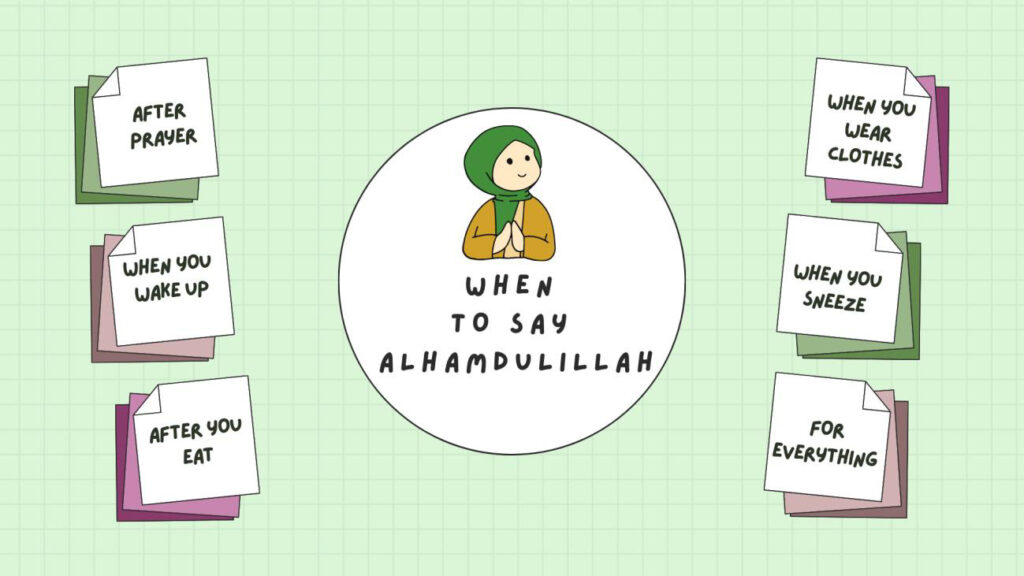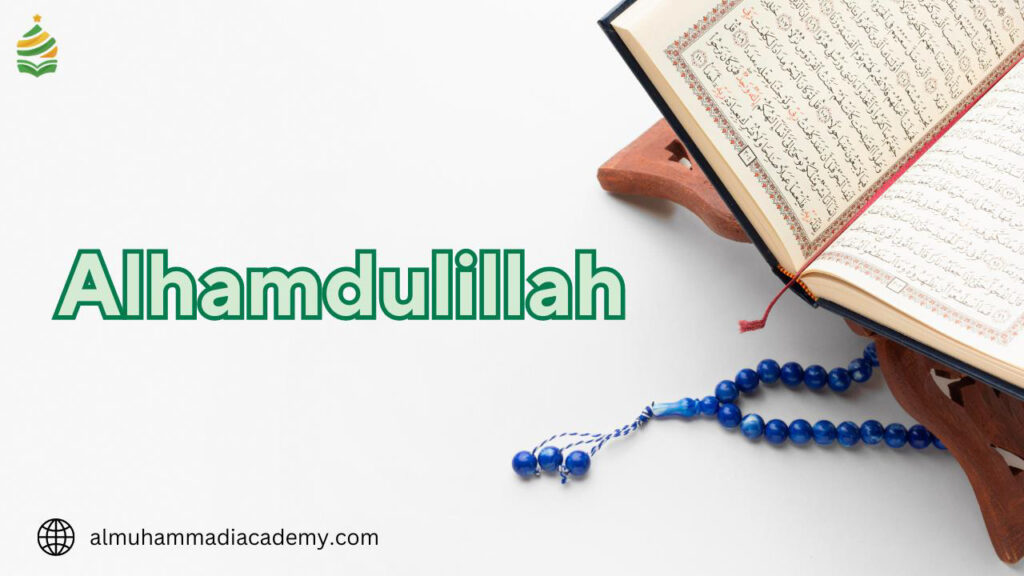Alhamdulillah, or “All praise is due to Allah,” is a short Arabic phrase that is used to express gratitude to Allah. It is one of the most common phrases in Islam, and it is said in a variety of contexts, from everyday greetings to formal prayers.
The word “Alhamdulillah” is a reminder of Allah’s many blessings, both big and small. When we say Alhamdulillah, we are acknowledging that everything we have is a gift from Allah, and we are grateful for His generosity.
This blog post will discuss the meaning of Alhamdulillah and present a guide on how and when to say it in order to show our appreciation and gratitude for Allah Almighty.
What does Alhamdulillah Mean?
Alhamdulillah meaning doesn’t include just one thing because when we say Alhamdulillah, we’re not only thanking Allah but also we’re praising Him. Therefore, the word Alhamdulillah in Arabic combines both praise and gratitude. As you say Alhamdulillah, you’re showing your appreciation for the blessing that Allah has bestowed upon you and you’re also praising Him.
Not only that, the word Alhamdulillah includes yet another layer of meaning. Unlike the word Madh (مدح ), Hamd (حمد ) includes a sense of love for the one it is directed to. Hence, saying Alhamdulillah springs from a feeling of love for our Creator whose blessings are innumerable.
Alhamdulillah meaning in English, Arabic, and Urdu:
Alhamdulillah in Arabic
Alhamdulillah is written in Arabic like this:
ٱلْحَمْدُ لُِلّٰهُِ
It can be found in multiple verses of the Quran such as the first verse of Surah Al-Fatiha:

Alhamdulillah in English
Alhamdulillah is translated from Arabic into English as “Praise be to Allah.” It is a phrase with which Muslims express their gratitude and praise for Allah.
Alhamdulillah in Urdu
Similarly, the word الحمد لله in Urdu serves the same meaning of thanking Allah and praising Him for His blessings.
Benefits of Saying Alhamdulillah
So, what good could come from saying Alhamdulillah?

1. It can increase our faith
One of the cornerstones of faith (Iman) in Islam is belief in the Divine Decree. Hence, showing gratitude and praise to Allah in times of ease and in times of hardship increases a person’s faith and makes it firm in the face of trials and doubts.
Saying Alhamdulillah strengthens our belief that whatever Allah has decreed for us whether in the past or in the future is what’s good for us, even if we fail to understand the wisdom behind it.
2. It can make us more humble
We often think that the degrees we got at school, the position we acquired at work, the spouse we married and so many other things are the results of our hard work alone. Saying Alhamdulillah for these things shakes off this feeling of entitlement that can drive you to think that you got so and so because you earned it or deserved it, not because Allah blessed you with this position, education, etc.
3. It can improve our physical and mental well-being
A growing body of research has been made on the psychology of gratitude. This research suggests that gratitude can have a number of positive benefits for our mental and physical health. For example, it can contribute to reducing stress, improving our mood, and boosting our immune system. When we say Alhamdulillah, we are essentially programming our minds to focus on the good things in our lives which serves to give us a better outlook on life and reduce anxiety and depression.
4. It can help us to overcome challenges
On the other hand, Allah tests His servants with hardship as He tests them with ease and welfare. Remembering this and thanking Allah even at a time of failure, mourning or devastation is what will help us to overcome these trials and keep our Iman in Allah intact. In a world that is often filled with negativity, Alhamdulillah is a powerful reminder of the good that exists in the world.
5. It is a door to great reward
The greatness of the phrase Alhamdulillah lies in the fact that it is a form of both Dhikr and Duaa’. With it, you are remembering Allah and expressing thanks and gratitude to Him. In addition, Prophet Muhammad PBUH described it as the best Duaa’ as it includes praising Allah for His blessings and asking Him for more.
Further evidence of its great reward is that, together with Subhanallah, they fill one’s scale of deeds on the Day of Judgment.
When to Say Alhamdulillah
Here are some examples of situations when you should say Alhamdulillah:

1. After prayer
Once you finish prayer, sit down for a few minutes and say Alhamdulillah 33 times thanking Allah for the opportunity to pray and for accepting your prayers.
2. When you wake up
As a way of showing gratitude for waking up and having another day and another opportunity to worship Allah and glorify Him, you should say this upon waking up in the morning:
“Alhamdulillah-hillathee ah-yana ba’da ma ama tana wa ilayhi nushoor”
“الحمد لله الذي أحيانا بعد ما أماتنا وإليه النشور ”
3. After you eat
After you’re done with your food, you should say:
“alhamdulillah allazie aatemnee haza warzakneh men ghayr hawel mennee wala qowah”
الحمد لله الذي أطعمني هذا ورزقنيه من غير حول مني ولا قوة
4. When you wear clothes
This is another example of a blessing that we often overlook; the blessing of clothes and garments. For that, you should thank Allah by saying:
“alhamdulillah allazie kasaani haza al- thobe men ghayr hawel mennee wala qowah.
الحمد لله الذي كساني هذا الثوب من غير حول مني ولا قوة
5. When you sneeze
A Muslim is required to say Alhamdulillah after sneezing. The response to Alhamdulillah in this situation is “yarhamukum Allah يرحمكم الله ” and here the person is praying for Allah’s mercy to be granted for the one who sneezed
6. Say Alhamdulillah for Everything
In addition to the previously mentioned examples, we should say Alhamdulillah for everything. Alhamdulillah for everything in Arabic is (الحمد لله على كل حال ). By doing so, we are not just saying thank you to Allah for the good things in our lives but we are also acknowledging that even the challenges we face are a part of Allah’s plan for us. We are trusting that Allah will see us through these challenges and that He will ultimately bring us closer to Him.
The phrase “Alhamdulillah for everything” is a reminder that we should never take anything for granted. We should also remember that Allah’s blessings are immeasurable and we cannot count them even if we tried. We should always be grateful for the blessings in our lives, and we should always trust Allah’s plan for us.
How to say Alhamdulillah
Alhamdulillah in Arabic text looks like this:
الحمد لله
It is pronounced like “al-Ḥamdu lillāh” and it is said when you wish to thank Allah for the many graces you have in your life, even in hard times. You can also use a longer form of Tahmid which is “al-ḥamdu l-illāhi rabbi l-ʿālamīn”, meaning “all praise is due to God, Lord of all the worlds.”
How to say Alhamdulillah with sincerity
Sometimes, we’re caught in the act of repeating the word Alhamdulillah mindlessly without pondering over it and actually saying it with sincerity. The purpose of saying Alhamdulillah is to be mindful of the numerous blessings that Allah has given you. Even in times of hardship when it gets hard to see the silver lining in a cloudy sky, saying Alhamdulillah sincerely and genuinely reminds us that there are still many things that we need to be grateful to Allah for.
It reminds us that Allah’s destiny for us is faultless, no matter what we think with our limited minds. With this mindset, we can say Alhamdulillah for everything with a present heart, mind and soul.
Conclusion
According to Almuhammadi Academy Making Alhamdulillah a part of your daily life can have a profound impact on your life. It can help you to become more grateful, positive, and optimistic. So how can you do that?
First, take time each day to reflect on the things you are grateful for, whether big or small. You can even express this by writing down one blessing each day and keeping it in a gratitude journal. Going through these pages will remind you of Allah’s great blessings when you fail to notice them.
Second, make Alhamdulillah a part of your prayers. Include a prayer of gratitude in your daily prayers, and don’t forget to say it after you finish.
Third, use some mobile Dhikr applications that send reminders throughout the day for you to remember to say Alhamdulillah.
Fourth, make a habit of saying “Alhamdulillah” & “Mashallah Tabarakallah” before and after meals, when you wake up in the morning, and before you go to bed at night.
Making Alhamdulillah a part of your daily life is a simple but powerful way to improve your life. It is a way of connecting with Allah and expressing your gratitude for all that you have. So why not start today?

